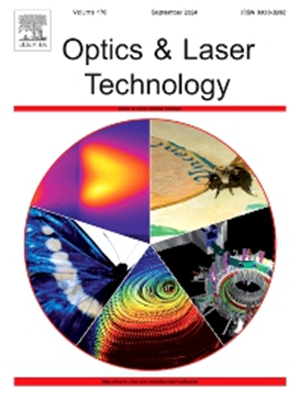Fabrication and quality improvement of film cooling holes via picosecond laser drilling assisted by waterjet and post-electrochemical machining
IF 4.6
2区 物理与天体物理
Q1 OPTICS
引用次数: 0
Abstract
Film cooling holes (FCHs) are of superior importance for blade protection and performance improvement in aircraft engine, while their fabrication requires high efficiency, high precision and extremely good surface quality, making it a challenging task. In this study, the ultrashort picosecond (ps) laser is employed to drill the FCHs on the DD6 single crystal superalloy, based on which the assisted waterjet is further introduced to reduce thermal damage, and the electrochemical machining (ECM) is also added as a post-processing manner for further quality improvement. It has been found through orthogonal tests that the pulse repetition frequency possessing most significant influence on hole taper during direct ps-laser drilling. The introduced low-pressure waterjet effectively eliminates the thermal damage such as slag attachment and recast layer, and the waterjet angle affects the hole profile obviously. After conducting post-ECM, the hole taper decreases continuously with an increase in processing time and applied voltage. In addition, the laser-induced periodic surface structure (LIPSS) has been observed on the sidewall, while an obvious decrease in LIPSS wavelength has been confirmed after post processing. Moreover, simulation study of temperature evolution is carried out by developing a two-temperature model, demonstrating that the lattice temperature surpasses the boiling point within 0.182 ps, and the ablation can be precisely localized within laser irradiation zone. The simulation of flow field on DD6 surface has also been conducted, and the distributions of flow velocity, pressure and thickness are obtained, which helps understand the effect of waterjet on the drilling process.
通过皮秒激光钻孔并辅以水刀和电化学后加工,制作薄膜冷却孔并提高其质量
薄膜冷却孔(FCHs)对飞机发动机叶片的保护和性能的提高具有极其重要的意义,而其制造要求高效率、高精度和极好的表面质量,因此是一项具有挑战性的任务。本研究采用超短皮秒 (ps) 激光在 DD6 单晶超合金上钻削 FCH,在此基础上进一步引入辅助水刀以减少热损伤,并增加电化学加工 (ECM) 作为后处理方式以进一步提高质量。通过正交试验发现,在直接ps 激光钻孔过程中,脉冲重复频率对孔锥度的影响最大。引入的低压水刀能有效消除熔渣附着和再铸层等热损伤,水刀角度对孔轮廓的影响也很明显。进行后电化学处理后,随着处理时间和施加电压的增加,孔锥度不断减小。此外,在侧壁上还观察到了激光诱导的周期性表面结构(LIPSS),并证实后处理后 LIPSS 波长明显减小。此外,还通过建立双温模型对温度演变进行了模拟研究,结果表明晶格温度在 0.182 ps 内就超过了沸点,而且烧蚀可以在激光照射区内精确定位。此外,还对 DD6 表面的流场进行了模拟,得到了流速、压力和厚度的分布,有助于理解水刀对钻孔过程的影响。
本文章由计算机程序翻译,如有差异,请以英文原文为准。
求助全文
约1分钟内获得全文
求助全文
来源期刊
CiteScore
8.50
自引率
10.00%
发文量
1060
审稿时长
3.4 months
期刊介绍:
Optics & Laser Technology aims to provide a vehicle for the publication of a broad range of high quality research and review papers in those fields of scientific and engineering research appertaining to the development and application of the technology of optics and lasers. Papers describing original work in these areas are submitted to rigorous refereeing prior to acceptance for publication.
The scope of Optics & Laser Technology encompasses, but is not restricted to, the following areas:
•development in all types of lasers
•developments in optoelectronic devices and photonics
•developments in new photonics and optical concepts
•developments in conventional optics, optical instruments and components
•techniques of optical metrology, including interferometry and optical fibre sensors
•LIDAR and other non-contact optical measurement techniques, including optical methods in heat and fluid flow
•applications of lasers to materials processing, optical NDT display (including holography) and optical communication
•research and development in the field of laser safety including studies of hazards resulting from the applications of lasers (laser safety, hazards of laser fume)
•developments in optical computing and optical information processing
•developments in new optical materials
•developments in new optical characterization methods and techniques
•developments in quantum optics
•developments in light assisted micro and nanofabrication methods and techniques
•developments in nanophotonics and biophotonics
•developments in imaging processing and systems

 求助内容:
求助内容: 应助结果提醒方式:
应助结果提醒方式:


